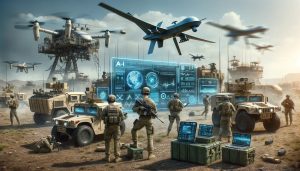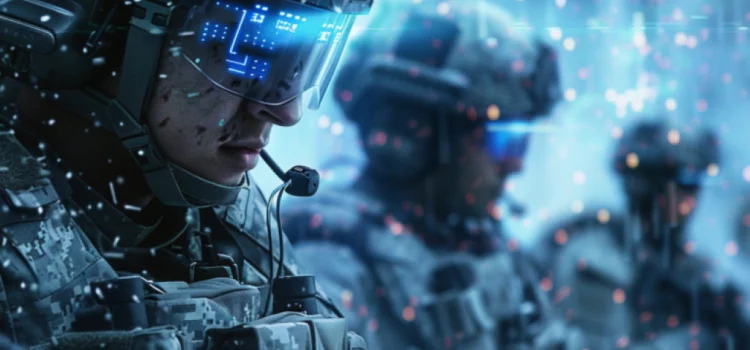
Introduction
The advent of artificial intelligence (AI) has introduced transformative changes across various sectors, and modern warfare is no exception. From intelligence gathering to autonomous weapon systems, AI’s integration into military operations has revolutionized how conflicts are conducted and managed. This article explores the multifaceted impact of AI on modern warfare, delving into its implications, benefits, challenges, and ethical considerations.
The Evolution of Warfare
-
Historical Context
Warfare has evolved significantly over centuries, transitioning from primitive combat methods to sophisticated strategies involving advanced technology. The introduction of gunpowder, the industrial revolution, and the development of nuclear weapons marked significant milestones in the evolution of warfare.
-
The Digital Age
The late 20th and early 21st centuries saw the rise of the digital age, characterized by the proliferation of information technology and the internet. This era introduced cyber warfare, where digital attacks could cripple a nation’s infrastructure without physical confrontation.
AI in Modern Warfare

-
Intelligence Gathering
One of the most significant impacts of AI on modern warfare is in intelligence gathering. AI algorithms can analyze vast amounts of data from various sources, including satellite imagery, social media, and intercepted communications, to identify patterns and predict potential threats.
-
Satellite Imagery Analysis
AI-powered systems can process satellite images to detect changes in terrain, infrastructure, and troop movements. This capability enables military strategists to monitor adversaries and plan operations with greater precision.
-
Social Media Monitoring
AI tools can sift through social media platforms to identify potential threats and gather intelligence on enemy activities. By analyzing posts, comments, and interactions, AI can provide insights into public sentiment and emerging threats.
-
Autonomous Systems
AI has paved the way for the development of autonomous systems, including drones and robotic vehicles, which can perform various tasks without human intervention.
-
Unmanned Aerial Vehicles (UAVs)
UAVs, commonly known as drones, have become a staple in modern warfare. Equipped with AI, these drones can conduct surveillance, deliver supplies, and execute precision strikes with minimal human oversight.
-
Autonomous Ground Vehicles
Robotic ground vehicles, powered by AI, can perform tasks such as reconnaissance, mine detection, and supply transport. These vehicles reduce the risk to human soldiers and enhance operational efficiency.
-
Decision-Making Support
AI systems can assist military commanders in making informed decisions by providing real-time analysis and recommendations. These systems consider multiple variables and scenarios, enabling commanders to choose the best course of action.
-
Predictive Analytics
AI-powered predictive analytics can forecast enemy movements and potential outcomes of various strategies. This capability allows military planners to anticipate threats and adjust their tactics accordingly.
-
Simulation and Training
AI-driven simulations provide realistic training environments for soldiers, enhancing their preparedness for real-world scenarios. These simulations can replicate complex combat situations, allowing soldiers to practice and refine their skills.
Benefits of AI in Modern Warfare

-
Enhanced Efficiency
AI systems can process and analyze data at speeds far beyond human capabilities, enabling faster decision-making and response times. This efficiency is crucial in modern warfare, where rapid adaptation to changing circumstances is essential.
-
Reduced Human Risk
Autonomous systems and AI-driven decision support reduce the need for human soldiers to be directly involved in dangerous operations. This reduction in human risk is a significant advantage, particularly in high-stakes combat situations.
-
Improved Accuracy
AI-powered systems can execute tasks with a high degree of accuracy, minimizing collateral damage and increasing the effectiveness of military operations. Precision strikes, for example, can target specific threats while avoiding civilian casualties.
-
Cost Savings
While the initial investment in AI technology can be substantial, the long-term cost savings are significant. AI systems can perform tasks that would otherwise require large numbers of personnel and resources, reducing overall operational costs.
Challenges and Ethical Considerations

-
Technological Limitations
Despite its potential, AI technology is not without limitations. AI systems can be susceptible to errors and biases, which can have serious consequences in a military context. Ensuring the reliability and accuracy of AI systems is a critical challenge.
-
Cybersecurity Risks
The integration of AI in modern warfare introduces new cybersecurity risks. AI systems can be targeted by cyberattacks, potentially compromising sensitive data and critical operations. Protecting AI systems from cyber threats is a paramount concern.
-
Ethical Dilemmas
The use of AI in warfare raises ethical questions about the role of autonomous systems in combat. The potential for AI to make life-and-death decisions without human intervention is a contentious issue. Establishing clear ethical guidelines and accountability measures is essential.
-
Legal and Regulatory Issues
The deployment of AI in warfare also presents legal and regulatory challenges. International laws and treaties must be updated to address the implications of AI-driven military operations. Ensuring compliance with these regulations is crucial to maintaining global stability.
The Future of AI in Modern Warfare

- Continued Advancements
As AI technology continues to advance, its role in modern warfare is likely to expand. Future developments may include more sophisticated autonomous systems, enhanced decision-making tools, and improved intelligence-gathering capabilities.
- Collaboration and Integration
The successful integration of AI in modern warfare will require collaboration between military organizations, technology companies, and regulatory bodies. This collaboration will ensure that AI systems are developed and deployed responsibly and effectively.
- Balancing Innovation and Ethics
Striking a balance between technological innovation and ethical considerations will be crucial in the future of AI in modern warfare. Establishing robust ethical frameworks and regulatory oversight will help mitigate the risks associated with AI deployment.
Conclusion
The impact of AI on modern warfare is profound and far-reaching. From enhancing intelligence gathering to enabling autonomous systems, AI has revolutionized how military operations are conducted. While the benefits of AI in warfare are significant, addressing the associated challenges and ethical considerations is imperative. As AI technology continues to evolve, its role in modern warfare will undoubtedly expand, shaping the future of conflict and defense.










